
News avoidance and the displacement of publishers by social media as a primary source for news were among ten key trends discussed by Nic Newman of the Reuters Institute in his presentation to the Press Gazette Future of Media Technology Conference in London.
He used 12 years of data from the world’s biggest survey on news consumption to highlight the key trends in the UK.
Newman also provided some ideas about how publishers can tackle the biggest challenges.
1) Print and TV are in sharp decline as a source of news
Looking at UK data based on an annual online survey of 2,000 people Newman found that TV and print are in sharp decline as a source of news. The survey asked respondents if they had used any of these categories as a source of news over the previous week.
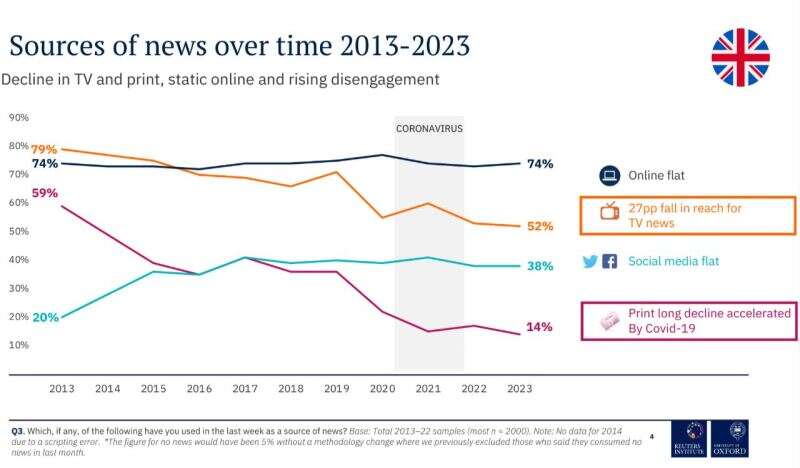
Newman said: “In the UK, the percentage of people who say they use television news is going down very considerablyb – 27 points or so over this period. You can see that decline in print obviously accelerated by Covid.
“But what’s interesting is that the online has not really changed very much. So certainly since 2017, social media has been pretty flat and online has been pretty flat.”
2) Over 55s still prefer TV as a source of news but youngest now choose social media
Looking at data on news consumption from this year he highlighted the fact that 18-24 year-olds now cite social media as their main source of news for the first time.
“Older people basically still prefer the media they grew up with so television news is still by far the most important for over-55s. But for younger people, it’s obviously digital. But increasingly, it’s social media – particularly those 18-24s.
“They grew up with social media and social platforms and they have a much weaker connection with brands and are much less likely to go to a news site. For the first time most of them say that they prefer to go to social media rather than a news website and that’s very different from the millennials, the group which come before, who are more likely to say online news site as their main source of news. So that’s challenging for the news industry.”
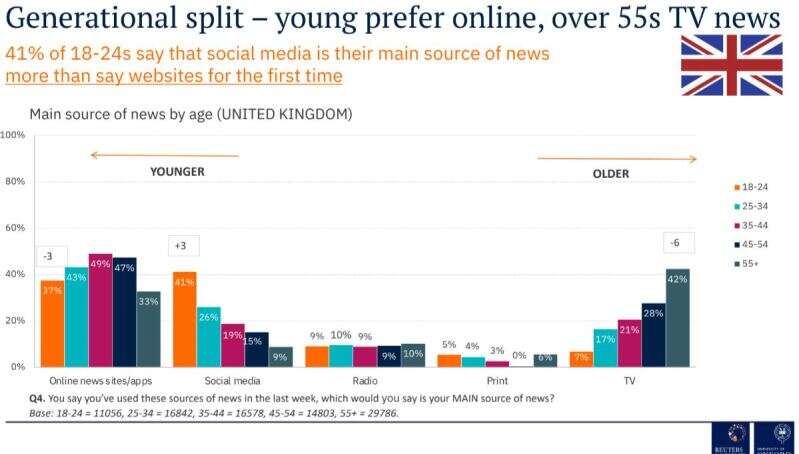
3) Facebook is waning as a source of news as video platforms surge
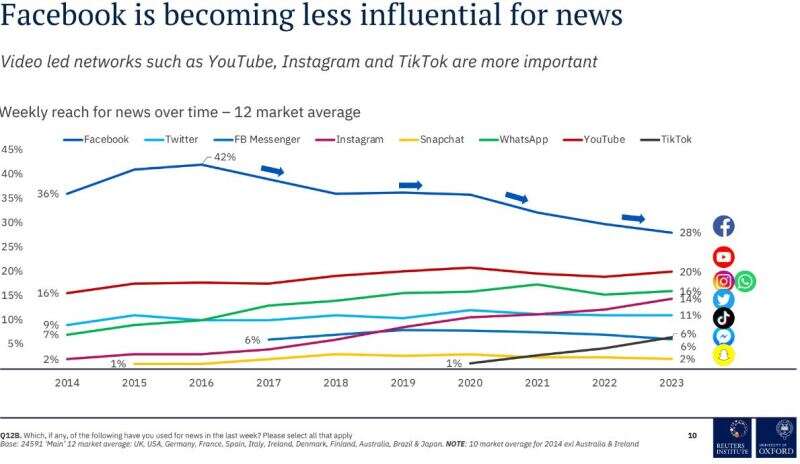
Looking at the aggregate of data from 12 countries since 2014 (covering the UK, US, Europe, Australia, Brazil and Japan) highlighted research on what social platforms respondents had used as a source of news over the previous week.
Newman said: “You can see the decline in terms of traffic from Facebook and use of Facebook for distributing, finding and consuming news. That’s partly obviously because Facebook themselves have been pulling back from news. Twitter hasn’t really changed.
“The growth has come from the video networks: Youtube, Instagram and Tiktok.”
Looking just at younger people in the UK (18-24s): “Facebook for any purpose is becoming much less important. So you can see that the tipping point in 2018 that was first driven by that shift towards Instagram, visual mobile-first media and then Tiktok.
“Facebook are focusing less on journalists and pulling back on journalism and pushing into creators to head off what’s going on with Tiktok.”
4) The shift towards video platforms on social is most pronounced for young
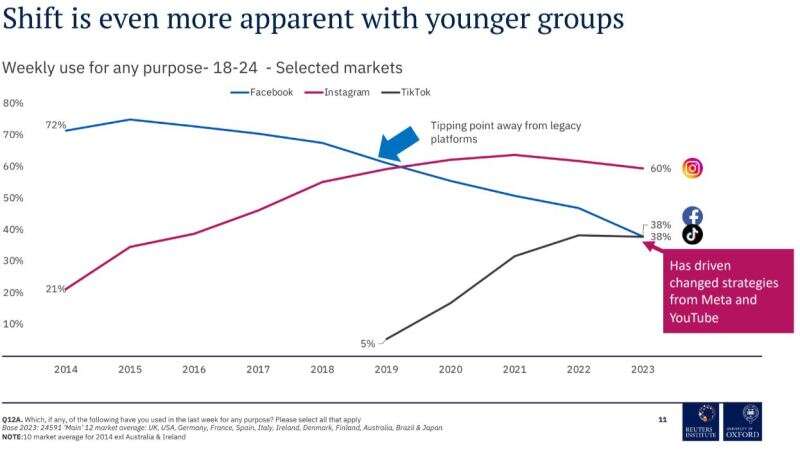
5) Social media users increasingly worry about the role of algorithms in selecting news
Newman also cited research from this year on the role of algorithms. UK social media users were asked to what extent they agree that having stories automatically selected on the basis of previous consumption was a good way to consume news.
The chart below shows 30% of under-35s agree with that statement compared with 49% in 2016. Among over-35s just 16% favour algorithm-chosen news.
“We did some work this year on algorithms, obviously partly because of the focus on AI, and one of the things we found is although people are using social media and young people are using social media, actually they have mixed feelings about it.
“Many of them are actually quite uncomfortable, and they’re more uncomfortable than they were when we last asked about this in 2016, particularly about those algorithms that are based on what you’ve read or watched before.
“The less good news is that all forms of selection have also gone down, including journalistic selection. And so the algorithms still come out on top of the journalists in our latest survey.”
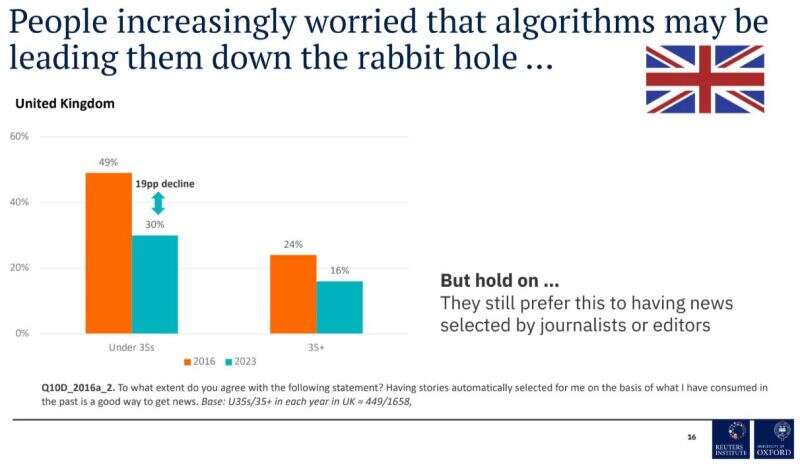
Reuters research suggests social media users say they want more reliable content, more diversity and less toxicity in their news feeds.
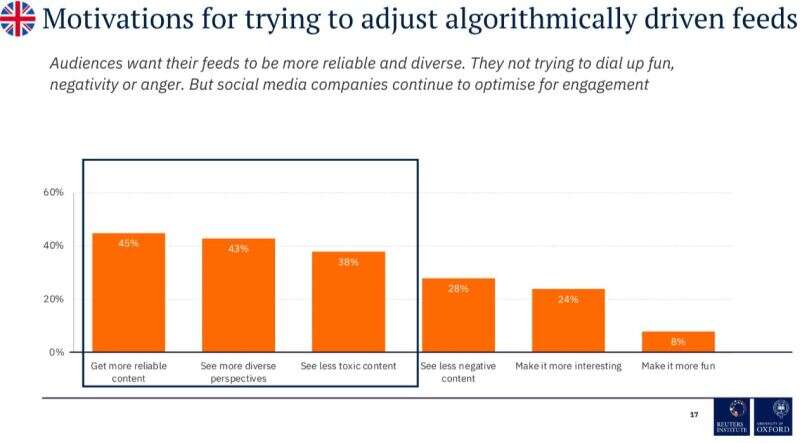
Newman said: “Many people are really trying to change what they see in their feeds, and they’re adjusting things or changing who they follow or trying to tweak the algorithms and settings in different ways. And we asked them why so, what is it that you’re unhappy about? And I found this really interesting that it’s not about more fun or entertaining content that comes right at the bottom. It’s about more reliability, less toxicity.
“There’s a signal that actually people are unhappy partly because they don’t know what to trust in these networks. So this is something we can potentially hold on for.”
6) The UK leads the world on declining interest in news
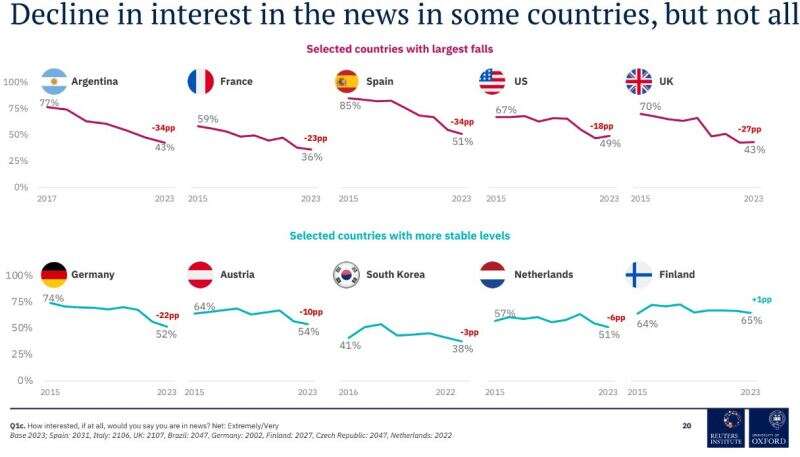
The Reuters Institute asks people in leading economies how interested they are in news. In the UK, the proportion saying “extremely/very” has fallen from 70% to 43% since 2015. Only Spain and Argentina have seen larger falls.
Newman said: “The percentage of people who say they are very or extremely interested in news has fallen really significantly, particularly since Covid. And we’re not sure what’s going on. You can see in the UK one of the fastest fallers.”
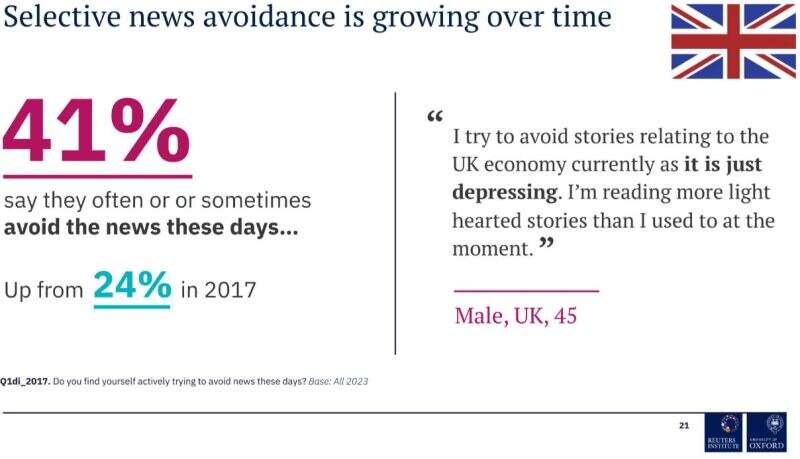
He noted that selective news avoidance is also growing in the UK, with 42% saying they often or sometimes avoid the news (up from 24% in 2017).
Newman said: “This is partly because of the feeling that the stories are relentlessly depressing, that they bring your mood down and they make you anxious: the economy and Ukraine are among the topics turning people are turning off from. This is linked to this problem of self care and how can we use news better.
“Our researchers were told ‘I’m more interested in news that is positive. I’m more interested in news that doesn’t just point out problems but actually offers me solutions or gives me agency. I’m interested in explainers and I’m least interested in the big stories of the day.’
“Part of the problem is that we are optimising on sites for the super users. But that in turn seems to be pushing some of these other people away.
“One of the things that AI might be able to help with is this. There’s different versions for these different types of people. We have one size fits all news products, and it’s working for some but not for others.”
7) Trust in UK news has plummeted in polarised post-Brexit UK
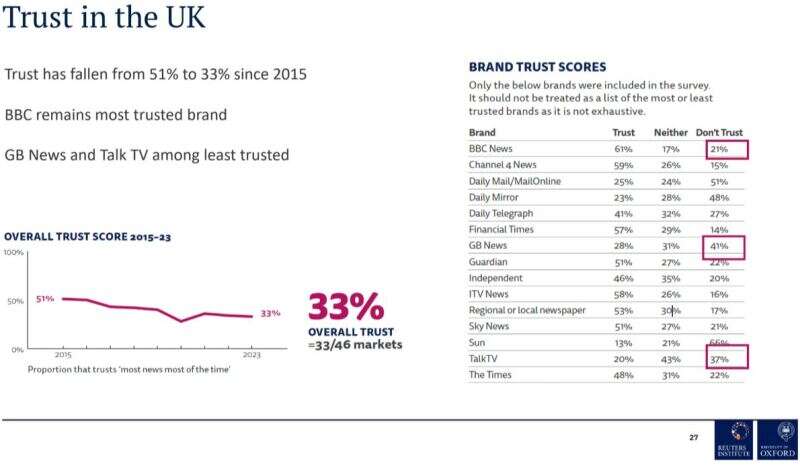
Asked whether they trust “most news most of the time” some 33% of people in the UK said “yes” this year, compared with 51% in 2015 (prior to the 2016 Brexit referendum).
Newman said: “People came back to media companies and we saw trust increased during Covid. But for the last couple of years, it’s been going back in a different direction. If you look at the UK, you see trust levels were around 50% in 2016 before the referendum and they’re now down to 33%.
“Our society has become very polarised over issues like Brexit, and people often blame the messenger so a lot of this has really to do with wider lack of trust in institutions, governments and all the rest of that. Increasing numbers of people are increasingly cynical about certain media companies and I think that that really relates to the the polarisation I was talking about earlier.”
8) Only 9% of Briton say they pay for news as subscriptions level off
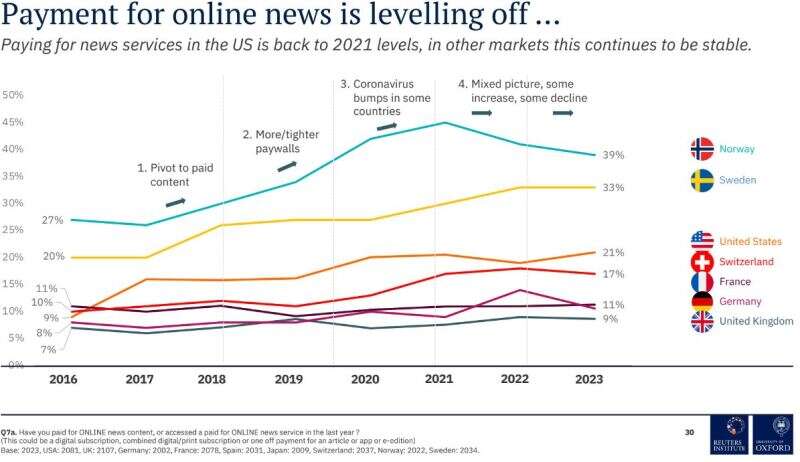
Looking at subscriptions, Newman said: “It’s been a bad year for journalism, a lot of layoffs particularly for ad-based models around the world. And many media companies really pushing into subscriptions.
“So we found that 39% had either cancelled or renegotiated the price of one or more of those news subscriptions in the last year. Energy prices and the cost of living came out as the number one reason. They were spending too much and had to cut some costs. So there’s a real challenge on retention right now which explains the slowing down to some extent.”
9) Most still prefer to read online news
Looking at UK data around online news consumption habits, Newman noted that all age groups still prefer reading over watching and listening to news (although 18-24s are most likely to prefer video/audio).
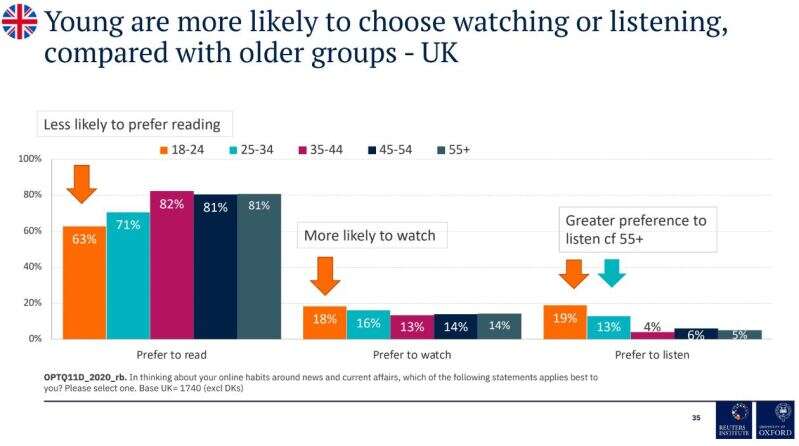
10) Podcasts have a meaningful (but not mass) audience
Looking at the most popular news-related podcasts, Newman noted ruefully that there appears to be a boundless appetite for extended conversations between men.
He said: “Podcasts don’t reach all young people but they reach upmarket young people. This is not a place to get hard-to-reach audiences. And it’s also not really getting to the mass audience yet, so only 34% in the UK say they’ve consumed a podcast. Loads of people have not consumed a podcast.
“It’s a meaningful audience and they are listening for long periods of time and they’re younger.
“We asked people to name the top podcasts in the UK. So we said which news podcast do you pay most attention to?
“And this was really interesting to me because I studied podcasts for a long time and I was very into the deep dive podcasts such as Today In Focus from The Guardian. But I think over the last few years it’s really been the growth of these extended chat podcasts often hosted by two men or three men who talk for hours in some cases and are right at the top of the charts.”
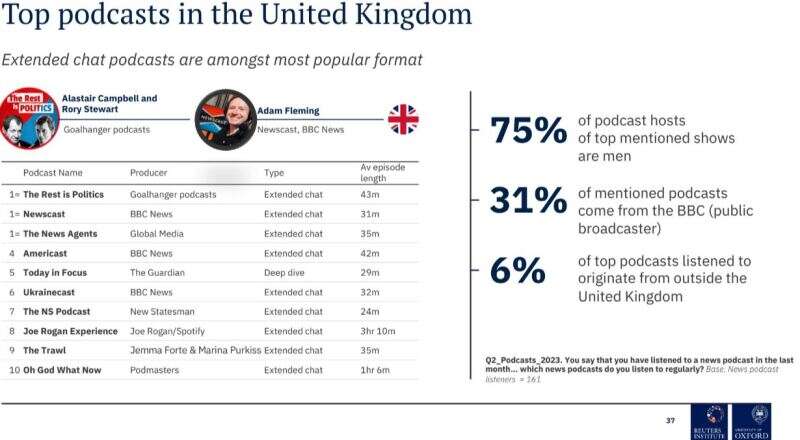
Email pged@pressgazette.co.uk to point out mistakes, provide story tips or send in a letter for publication on our "Letters Page" blog
